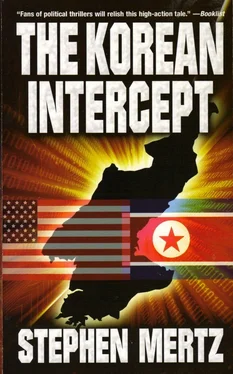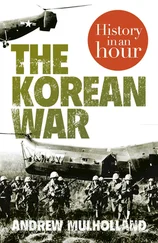Stephen Mertz - The Korean Intercept
Здесь есть возможность читать онлайн «Stephen Mertz - The Korean Intercept» весь текст электронной книги совершенно бесплатно (целиком полную версию без сокращений). В некоторых случаях можно слушать аудио, скачать через торрент в формате fb2 и присутствует краткое содержание. Жанр: Триллер, на английском языке. Описание произведения, (предисловие) а так же отзывы посетителей доступны на портале библиотеки ЛибКат.
- Название:The Korean Intercept
- Автор:
- Жанр:
- Год:неизвестен
- ISBN:нет данных
- Рейтинг книги:3 / 5. Голосов: 1
-
Избранное:Добавить в избранное
- Отзывы:
-
Ваша оценка:
- 60
- 1
- 2
- 3
- 4
- 5
The Korean Intercept: краткое содержание, описание и аннотация
Предлагаем к чтению аннотацию, описание, краткое содержание или предисловие (зависит от того, что написал сам автор книги «The Korean Intercept»). Если вы не нашли необходимую информацию о книге — напишите в комментариях, мы постараемся отыскать её.
The Korean Intercept — читать онлайн бесплатно полную книгу (весь текст) целиком
Ниже представлен текст книги, разбитый по страницам. Система сохранения места последней прочитанной страницы, позволяет с удобством читать онлайн бесплатно книгу «The Korean Intercept», без необходимости каждый раз заново искать на чём Вы остановились. Поставьте закладку, и сможете в любой момент перейти на страницу, на которой закончили чтение.
Интервал:
Закладка:
In the Politburo conference room, two middle-aged men sat at a large table, summoned to a hastily-called emergency meeting. They wore identical green uniforms that bore no insignia of rank. All insignia had been abolished from The People's Liberation Army in 1965, except for a single red star on the cap. Each man's cap was before him on the highly polished table. Opposite the bay window was a wall-to-wall mural of a young, dynamic Chairman Mao leading a column of youthful soldiers on the Long March, pointing the way against a backdrop of snow-capped mountains.
An adjoining door to the office of the chairman of the Central Committee opened and Huang Peng, the defense minister, entered the conference room. In his seventies, Huang was thin-boned with a shock of white hair above a narrow face. He was the second ranking member of the Politburo, responsible only to the chairman himself. The other two stood and did not sit until Huang took his seat at the head of the table.
Huang spoke abruptly. "You are aware of the space shuttle Liberty launched today by the Americans. We have received word that the Americans have lost the shuttle from their radar. One hour ago, they received an emergency distress call before losing contact again for a final time. The transmission has been traced to a sector along our border with North Korea, in the region of Mount Paekdu."
General Chou, a ranking member of the Military Affairs Commission, was the exact physical opposite of Huang. Chou was heavyset and corpulent, with the eyes of a ferret. "Could this be a trick? An intelligence probe by the Americans to test and analyze our response?"
"There is that possibility," Huang acknowledged. Like them, he was a chain-smoker. The room was hazy with cigarette fumes. "If it is a trick, it is an audacious one. The Americans have officially notified us. Thus far none of this has been made public, but of course it will only be a matter of hours before the world learns of it."
Li Juntao, seated to Huang's left, was the third ranking member of the Politburo, which made him the army chief of staff. His compact, stocky form was all muscle. "The Americans have requested our cooperation?" He spoke with a heavy Cantonese dialect.
"They have demanded it."
Chou bristled. "They are in no position to demand anything. Our refusal would force them to act. Their only response would be to lose face or mount an incursion. They dare not risk a military confrontation with China."
Huang placed a fresh cigarette in an ebony holder. He touched the cigarette with flame from a lighter and replied through a plume of exhaled smoke. "The chairman and I are of the opinion that they would take such a risk, if they were certain that their shuttle did go down within our borders."
"What if the shuttle went down inside North Korea?" Li asked.
"We have contacted Pyongyang, as did the Americans. They claim to know nothing of it. But frankly, comrades, what the Koreans say is immaterial. It does not matter whether the shuttle went down in China or in North Korea. What need only concern us at this time is that a thorough search be initiated at once, and that every effort be expended to locate and secure the shuttle and the American defense satellite onboard, or its remains. There is the possibility that the pilot may have succeeded in setting the spacecraft down relatively intact. As you are aware, our space program is primitive in comparison to the West. We would find much aboard Liberty that would be extremely useful to China, equipment and information that the Americans would otherwise hardly be inclined to share with us."
"If the shuttle went down within our territory," Li began, "why hasn't our radar-"
"The shuttle was equipped with technology to evade radar."
Li frowned. "I served in Shenyang Province, the region of which we speak. There is extremely rugged terrain on both sides of that border. Finding the shuttle, if it is there, will not be easy."
"No one has suggested that it would be." Huang spoke curtly. "I am aware that you are familiar with that area, General. Therefore you will report at once to our regional headquarters at Shenyang. This matter will receive top priority and classification at every level."
La blinked his surprise. "Comrade?"
"You will meet with the regional commander to initiate a full-scale search and salvage operation without delay, mountain by mountain, valley by valley, if necessary." Huang paused for emphasis. "You will search along both sides of the border."
Li's frown deepened. "That would constitute a Chinese invasion of North Korea."
"The peasant filth who rule from Pyongyang will not acknowledge it as such, especially if they do know where the shuttle is located. They are the ones who will not risk a confrontation with us. North Korea's military is formidable, but their government is bankrupt. They would not exist as a nation had we not come to their aid during their war with the Americans. Yet they were so quick to turn from us for armament and money when the Soviet Union was strong and we were not. Now they would come crawling back to us. No, we need not concern ourselves with those bastard sons of mother China."
"The Americans then," said Li. "They will do anything to get their astronauts back, dead or alive. You're right, Comrade Defense Minister. The Americans will invade China or North Korea, if we force their hand."
Huang smiled tersely. "Let the Chairman and myself concern ourselves with that, comrade. Who is to say, perhaps you find only wreckage and human remains with nothing salvageable. If that proves to be the case, China will gladly return the useless remains to America as a gesture of humanitarian goodwill. But first it is imperative that we find the Liberty."
"We will not be able to stall the Americans for long," Chou said.
Huang nodded. "That is why time and thoroughness are of the essence. General Li, the shuttle or its wreckage must be found."
Li rose from his chair. "I leave immediately for Shenyang. I will locate the shuttle. Nothing will stop me. But I do have one question, comrades. What if there are survivors?"
"That would be highly unlikely," said Huang. "But if that is the case, you will advise us and the situation will be dealt with."
"In what way, may I ask?"
"That need not concern you at this time, Comrade General. Every possible contingency is being considered. Go now. The stakes are high and there is no time to lose."
Chapter Four
Washington, DC
In the White House, the president met off the record with his closest advisors in a cramped basement facility called the Situation Room. A high-tech, highly secure facility once reserved for managing the occasional world crisis, these days it was in almost constant use. The Situation Room had become one of the busiest parts of the West Wing. The president sat at the head of a conference table. Also present were the secretary of defense, the secretary of state, the director of the Central Intelligence Agency and the national security advisor. And there was General Curtis McMann, a uniformed, barrel-chested, ruddy-cheeked five-star in charge of the military space program.
While the others leaned forward in their chairs, McMann stood at the president's shoulder and pointed out the triangle drawn on a map of Asia that was spread flat on the table in front of the president. "Their Mayday was picked up at several points around the region. We've triangulated the farthest points of reception and have narrowed down the probable crash site to this region."
The president scrutinized the map. "Several hundred miles?" he noted without enthusiasm.
"At this point, yes sir. The Mayday was picked up by one of our spy ships in the Sea of Japan off the North Korean coast, by a Russian weather station at Lake Baykal and by a commercial Japanese pilot on a Tokyo to Hong Kong flight."
Читать дальшеИнтервал:
Закладка:
Похожие книги на «The Korean Intercept»
Представляем Вашему вниманию похожие книги на «The Korean Intercept» списком для выбора. Мы отобрали схожую по названию и смыслу литературу в надежде предоставить читателям больше вариантов отыскать новые, интересные, ещё непрочитанные произведения.
Обсуждение, отзывы о книге «The Korean Intercept» и просто собственные мнения читателей. Оставьте ваши комментарии, напишите, что Вы думаете о произведении, его смысле или главных героях. Укажите что конкретно понравилось, а что нет, и почему Вы так считаете.











